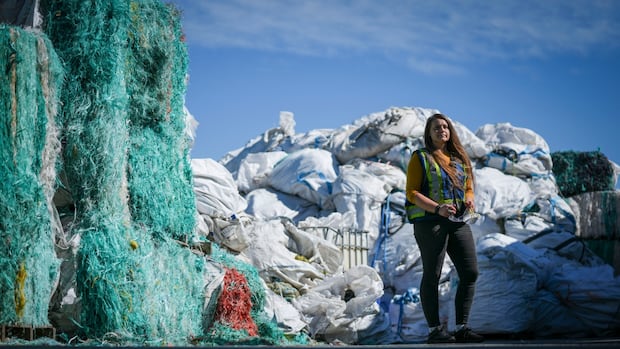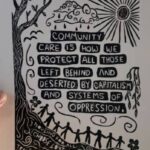CanadaCanada’s first marine waste recycling program has been turning abandoned fishing gear and other plastic waste from the ocean into pellets for new products for five years. But now, federal and provincial money has dried up to tackle ocean waste.Federal program to collect ghost gear and B.C. coastal cleanup fund both ended this yearYasmine Ghania · CBC News · Posted: Sep 21, 2025 4:00 AM EDT | Last Updated: 5 hours agoChloé Dubois, co-founder of The Ocean Legacy Foundation, is pictured near piles of plastic waste found in the ocean that will be recycled in Richmond, B.C. Their non-profit, in operation since 2021, is one of 143 projects that received support from DFO’s Ghost Gear Fund, which has no money this year. (Ben Nelms/CBC)At a large warehouse full of roaring recycling machines, Chloé Dubois stands beside a sack full of thousands of tiny plastic pellets.Previously fishing ropes and nets, the pellets are now giving new life to marine plastic waste choking the oceans that surround Canada.Dubois is the co-founder and executive director of the Ocean Legacy Foundation, a British Columbia non-profit that operates what it calls Canada’s first marine waste recycling program.”Plastic pollution is one of the biggest challenges facing our time,” she said. “We really need to conserve the biodiversity we have in Canada as well as internationally. So we really need to be better at managing these materials.”But now, government cuts are putting the program at risk. While Ocean Legacy gets some revenue from selling those pellets to plastics manufacturers, it has also relied on money from provincial and federal ocean cleanup projects, such as the Ghost Gear Fund run by the Department of Fisheries and Oceans (DFO). Those funding streams were not renewed this year.”It’s impacted Ocean Legacy but also the entire community that’s involved in ocean cleanup,” said Dubois. “A lot of other organizations have had to lay people off.”The ghost gear problemAbandoned, lost or discarded fishing gear — also called “ghost gear” — is considered to be a leading cause of marine animal deaths. Worldwide, about 640,000 tons of gear are left in oceans every year, according to the United Nations Environment Programme. It can stay in oceans for hundreds of years and small whales, seals, sea lions, turtles and fish can get entangled in the nets or ropes and suffocate or starve.WATCH | Humpback whale freed after being entangled in fishing gear: Humpback whale freed after 2 weeks entangled in fishing gearA multi-day rescue operation by the Department of Fisheries and Oceans and others helped untangle a humpback whale dragging over 100 metres of fishing gear near one of B.C.’s Gulf Islands.While marine plastic waste is collected across Canada and dropped off at depots, Dubois wanted it to be repurposed.”There is a pretty big gap in the supply chain where a lot of manufacturers don’t know how to use recycled content or it’s too expensive,” Dubois said.Fishing gear is melted then diced into tiny pellets that will later be moulded into new products. (Ben Nelms/CBC)How it worksOutside the facility sits a mountain of discarded fishing nets, rope and other materials. Ocean Legacy gets the waste — about 800 to 1,000 tonnes per year — from its own cleanups and from community partners.The waste is then sorted, melted and diced into pellets which are sold to manufacturers who are then able to make new products, including patio furniture, flower pots and boards that resemble lumber.Robert James Pierson, co-founder and CEO of the leadership team at Raiiz Innovations Inc., a sustainable home building company, said he wants builders to use the boards in home construction.”Construction has such a bad reputation for the amounts of material that goes into landfills. We should be recycling so much more of the materials,” he told CBC News.Some objects like fishing rope only need to be sorted, washed and shredded before they can be used to make new products, according to Dubois.”So there’s a lot of different variety in terms of what we can do with the plastics and how we apply them into new product design and production,” she said.After the recycling process, marine waste can be turned into a variety of products, including patio furniture. (Andrew Lee/CBC)Ocean Legacy collects marine plastics from Nova Scotia and New Brunswick and wants to one day open a recycling facility on the East Coast.”It’s important to expand these types of marine recovery plastic programs from coast to coast because this is a national problem and it’s not going away,” Dubois said.Funding cutsThe problem is, crucial provincial and federal government support to clean up ocean garbage has gone away. From 2019 to 2024, DFO dedicated over $58 million to fund 143 projects across the country to clean up and repurpose ghost gear. But the department told CBC News there was no funding for 2025.”DFO will continue to engage Indigenous harvesters, the fishing industry and other partners and stakeholders on how to prevent and address ghost gear in Canada into the future,” it said in a statement.Plastic pellets are placed onto a machine during the recycling process at Ocean Legacy. (Ben Nelms/CBC)Similarly, no future funding has been identified for B.C.’s Clean Coast, Clean Waters initiative past 2024.The province said over 2,100 tons of marine debris were removed since the program began in 2020.”We remain committed to protecting our province’s shorelines from debris and plastic pollution, so they can be enjoyed for generations to come,”the B.C. Ministry of Environment and Parks said in a statement.Piles of plastics and waste found in the ocean that will be recycled are pictured at The Ocean Legacy Foundation in Richmond, B.C., on Tuesday. (Ben Nelms/CBC)Dubois said without funding from those programs, her organization is bringing in less than 50 percent of what it needs to sustain operations.She said there is a risk of losing experienced staff that have trained for years to do specialized cleanup and restoration work. Dubois said Ocean Legacy is now looking to diversify its revenue streams, potentially offering tug and barge services or online education.And even at full capacity, some environmentalists like Anthony Merante with Oceana Canada, a charity devoted to ocean conservation, say plastic recycling is only scratching the surface.”The reality is, if we don’t stop plastic production, if we don’t stop wasting so much plastic and generating so much plastic waste, it’s just going to always be cleaning up a mess that we’re constantly making,” Merante said in an interview.”So we need strong regulations to get rid of a lot of the unnecessary single-use plastics that we have just filling our lives.”ABOUT THE AUTHORYasmine Ghania is an Egyptian-Canadian reporter with CBC News, currently based in Vancouver. She covers the courts, sex crimes and more for local and national audiences. She previously reported in Ottawa, Toronto and all over Saskatchewan and was a finalist for a Canadian Association of Journalists award. Reach her at yasmine.ghania@cbc.ca
How plastic fishing gear waste is being recycled into patio furniture for now










